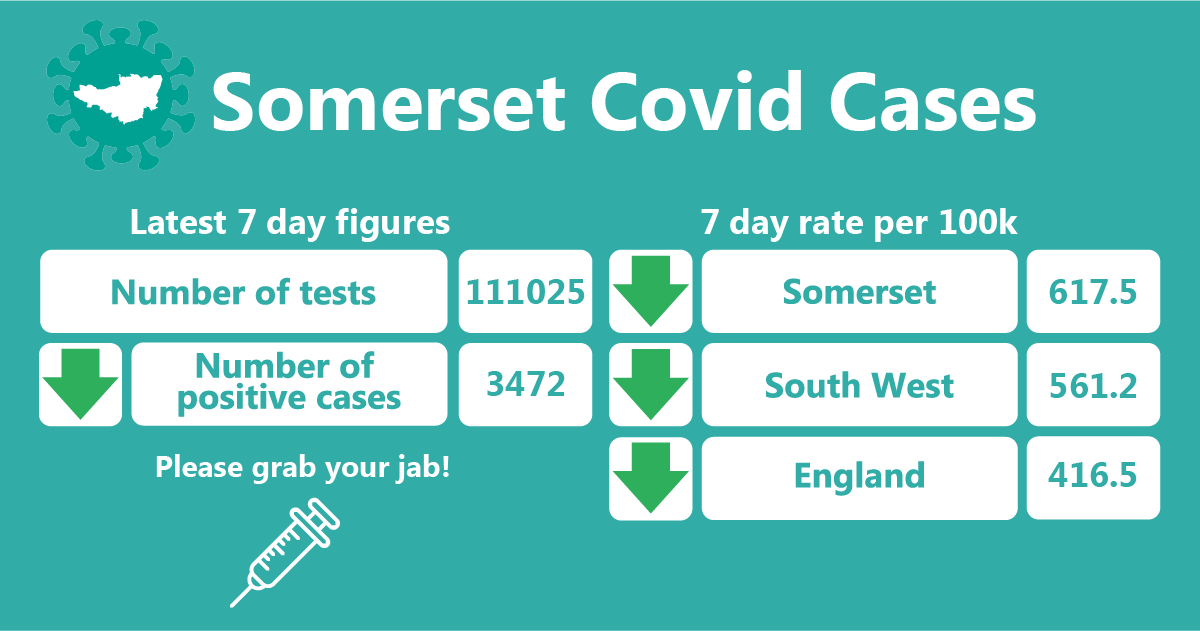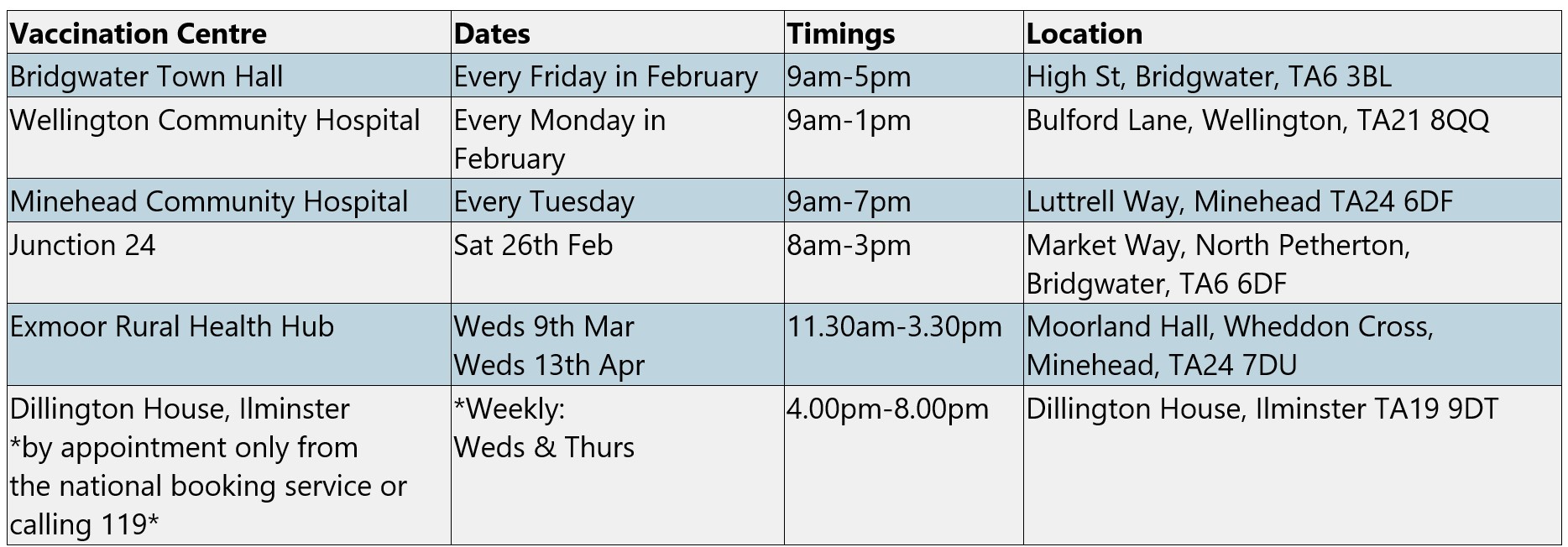|
|

|
Somerset's Covid-19 Update
Friday 25 February 2022
|
|
|
|
|
|
|
Case numbers remain high across the County, Covid-19 has certainly not gone away and it is vital to remember we can all still help prevent transmission of Covid-19, especially to the most vulnerable in our communities.
|
The SCC Public Health team still advise basic infection control measures should be followed, as these will help slow the transmission of many seasonal illnesses and have a positive impact on reducing sickness levels and improving business continuity. These include regularly washing your hands, maintaining appropriate cleaning regimes and keeping occupied spaces well ventilated.
|
|
|
|
|
|
|
|

|
|
Leader Somerset County Council
|
|

|
Director of Public Health
|
|

|
Clare Paul
Cabinet Member for Education and Public Health
|
|
|
|
|
‘Remember, everyone can catch it, anyone can spread it.’
|
|

|
|
|
Please note the Public Dashboard is being reviewed following changes to the national policy. This week, the Office for National Statistics shows that around one in every 25 people have coronavirus, and in Somerset, we know our case rates are still high.
|
In the week ending 20 February, approximately 111,025 tests were carried out across the county. There were with 3,472 new confirmed cases identified by these tests. The rates of Covid-19 in Somerset remain high but have decreased in the last reporting week to 617.5 per 100,000. This is above both the South-West average and the national average.
|
|
Hospitalisation data for Somerset had decreased to around 32 Covid-19 in-patients in Somerset hospitals.
|
|
|
|
|
|
A big thank you from Professor Trudi Grant, Director of Public Health for Somerset:
|
“I want to thank everyone who has played their part to support their community since the start of the pandemic, but it is not over yet. As many legally mandated restrictions are being lifted, our first lines of defence (like vaccination) become even more vital.
|
|
|
|
We should continue to be respectful of other people’s concerns and personal situations, and the public health advice is that anyone who tests positive for coronavirus, or who shows symptoms of having it, including a high temperature or cough, should stay at home and avoid contact with others. The same can be said for any other infectious illness, such a flu, or vomiting and diarrhoea.
|
|
In the past, many of us might have gone to work or school if we had cold-like symptoms for example, the British culture is to ‘soldier on’ if you can. But staying at home, whether with a tummy bug, cold or Covid-19, is something many of us have become used to throughout the pandemic, and it's been shown to be effective at limiting the spread of infectious disease. We need to make this the new normal”
|
|
|
|
(The helpline is available from 8am to 6pm every day, including weekends).
|
|
|
|
|
|
|
|
Changes to the guidance for schools:
- End of daily testing of close contacts and contact tracing
- Staff, students and pupils in mainstream education settings are no longer advised to undertake twice-weekly asymptomatic testing
|
|
|
Change to guidance for business:
- Since 24 February the legal duty for workers to tell employers if they are required to self-isolate has ended.
- From 1 April there will be an end to the current need for employers to explicitly consider Covid-19 in their risk assessments.
- From April 1, the Government will remove the Covid-19 provisions on statutory sick pay, which allow employees to claim sick pay and Employment and Support Allowance (ESA) from the first day they are not at work.
- It will be up to individual businesses to decide their approach to the wearing of face coverings. This means companies, theatres and shops could still request that coverings are worn by employees and customers.
- The ‘Working Safely’ guidance will be replaced with new public health guidance.
- Employers and workers should follow the guidance set out by the Government for those with Covid-19.
|
|
|
|
|
|
|
Advice for those with Covid-19 and their contacts
|
There is no longer a legal requirement for people with Covid-19 infection to self-isolate, however if you have any of the main symptoms or a positive test result, the public health advice is to stay at home and avoid contact with other people.
|
- people with any of the main symptoms of Covid-19
- people who have received a positive Covid-19 LFD or PCR test result
- people who live in the same household as, or who have had close contact with, someone who has Covid-19
|
|
|
|
|
|
|
From Thursday 24th February
- No legal requirements to self-isolate.
- If you test positive for Covid-19 or you suspect you have Covid-19 then you are advised to stay at home for at least 5 full days, to reduce the risk of infecting others. A lateral flow test can be taken on day 6 and day 7 and if both are negative and you don’t have a high temperature, then you can return to your normal routine.
- There is specific guidance for staff in particularly vulnerable services, such as adult social care, healthcare, and prisons and places of detention.
- Routine contact tracing has ended.
- Close contacts and those under 18 are no longer asked to test daily for seven days.
- Unvaccinated adults are no longer required to self-isolate if they have been in close contact with someone who has tested positive for Covid-19.
- The £500 self-isolation payment for those on lower incomes will end. People who are instructed to isolate before the 24 February will still be able to claim support payments within the next 42 days.
- Workers are not legally obliged to tell their employers when they are required to self-isolate. Employers and workers should follow Government guidance for those with Covid-19.
- Local authorities will continue to manage local outbreaks of Covid-19 in high risk settings as they do with other infectious diseases.
|
|
|
|
|
|
Statutory sick pay and employment support allowance will only start being paid after four and seven days of absence, rather than immediately.
|
|
|
|
|
|
|
|
Free testing in England will come to an end with most people having to pay for PCR and lateral flow tests.
|
- There will be some exceptions with free symptomatic tests remaining for NHS patients and in care homes, and some asymptomatic testing for both. Free tests will also be available for some people in the general public and the Health Security Agency (UKHAS) will confirm those who will be eligible soon. It is expected to be people aged 80 and above or those with compromised immune systems.
Covid status certificates will no longer be needed, and people will not be expected to show proof of vaccination.
|
|
Wider guidance for businesses will change, for example an end to the current need for employers to explicitly consider Covid in their risk assessments.
|
|
|
|
|
|
|
|
Spring Covid-19 vaccine for most vulnerable
|
The Joint Committee on Vaccination and Immunisation (JCVI) has advised an additional spring booster dose for the most vulnerable individuals in the population - those aged 75 and over, older care home residents and the over 12s who are immunosuppressed
|
|
|
|
|
|
|
|
Every vaccine matters and there are plenty of walk-in and bookable slots available across the county over half-term. It’s quick, easy, and open to everyone 12+ for 1st, 2nd or booster doses.
|
You can also pre-book an appointment. To do this, visit www.nhs.uk/Covid-Vaccination or call 119 for an appointment. The helpline has over 200 languages available if you or someone you know requires an interpreter.
|
|
Over 80% of eligible residents have received two doses of the vaccination. The Vaccination Programme is working with health and community partners to identify locations for mobile vaccination pop-up clinics. By localising the offer, the programme aims to reduce barriers to access and better understand community needs.
|
|

|
|
|
|
|
|
|
Vaccination for 5 -11 year olds
The Joint Committee on Vaccination and Immunisation (JCVI) has now advised a non-urgent offer of two 10 mcg doses of the Pfizer-BioNTech Covid-19 vaccine to children aged 5 to 11 years of age who are not in a clinical risk group. Following the announcement this week, there will also be an additional booster dose offered to all adults over-75 and the most vulnerable over-12s in the UK in the Spring. Further details of how these programmes will be rolled are expected in the coming weeks.
|
|
Children aged five to 11 years old who are clinically at risk from coronavirus, or who live with someone who is immunosuppressed, are now eligible for a lower, paediatric dose of the Covid-19 vaccine. All eligible children will have been contacted by their GP or local NHS inviting them to book an appointment through a local booking system at their GP practice or a nearby vaccination centre. At the moment, this group will not be able to book through the national booking system
|
|
|
|
|
Please note: If a child has tested positive for Covid-19 and is not at high risk from Covid-19, they need to wait 12 weeks before they can have a Covid-19 vaccine. This starts from the date they had symptoms, or the date of the positive test if they did not have symptoms.
|
|
|
|
|
|
|
|
Free testing in England will come to an end on 31 March, with most people having to pay for PCR and lateral flow tests from 1 April.
|
In the meantime, free Lateral Flow Tests are still available to order online. You can order one pack online every 3 days. A pack contains 7 tests.
|
|
You can also call 119 free from mobiles and landlines. Lines are open every day, 7am to 11pm. 119 provides support in 200 languages. SignVideo is a free online British Sign Language (BSL) interpreter service for 119.
|
|
|
|

|
The Somerset Local Outbreak Management Plan outlines how we, the council, will work with the NHS Test and Trace Service, PHE, the NHS and other partners to ensure a whole system approach to preventing and managing local outbreaks. This can be found here.
|
Please like us on Facebook, follow us on Twitter and LinkedIn and share our posts with your networks to help us communicate these important messages.
|
We would really welcome your feedback on this email update, so please email any comments to the team using GHaslock@somerset.gov.uk.
|
|
Finally, please follow Trudi Grant, our Director of Public Health’s Twitter account here.
|
|
|
|
|
|
|
|